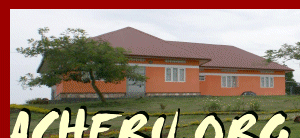|
|
| January
2014 Report - Latest news of the work of Acheru |
| Acheru is
becoming very busy again after a lull over Christmas. Things can
be quieter then with the staff in CoRSU, who deal with our
surgical referrals, taking a break. This means we have fewer
inpatients, and for CoRSU and for us it lets most of the staff
take a holiday at the same time, which is probably more
practical, when working with relatively small medical teams,
than having individuals taking breaks at different times. It
seems like Acheru is going to be very full. I’m also
collecting some statistics on patient numbers and conditions
seen and hope I can soon have a review of all that was done last
year. |
| As you know, we’ve
been thinking a lot about community work and the potential to do
more. This could be through locating children needing surgery,
or arranging home treatment. There is also education and
prevention and we now want to look particularly at quality of
life for disabled children and their families in an environment
where the stigma of disability can severely affect the whole
family. |
| I’ve been
looking at information from the Acheru Community Based
Rehabilitation programme. Acheru operates in a number of
districts – Mukono, Wakiso, Kayunge, Iganga, Jinja,
Mityana, Rakai, Oyam, Gulu, among other districts in Uganda,
with some patients coming from outside the country, eg Southern
Sudan, Kenya, Tanzania and Congo. The most intensive work is
done in Mukono, Kayunge and Wakiso districts, and Oyam district
in the north. Of 721 children treated in 2013, 505 were from
these districts. 174 of these patients were followed up and
recruited with home visits through the CBR programme. We hope
all Acheru children can be helped to some extent, but around 150
per year have a radical improvement in their quality of life
after surgery, opening up new opportunities for them. |
| Priority core
areas of intervention have been identified for the CBR
programme: Health and Rehabilitation, Educational Support, Care
and Protection from mistreatment, Negative attitudes, and the
potential to improve income. We don’t want to lose our
focus with Acheru, where much of what we do seems to be unique
in Uganda, but in working with children we want to look beyond
the disability and its treatment to quality of life and how this
can be enhanced. |
| I should make
clear that the Christian ethos of the work remains and is kept
under review. It’s central to the work, and I commend the
staff for dealing with this in a way which maintains an
environment in which all patients and relatives feel
comfortable, including our high proportion of Moslem patients. |
| Brian Dorman |
|
|
|



